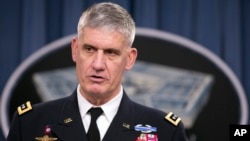Africa Command is the newest geographic command in the U.S. military structure, and despite the vast size of the African continent it helps secure, it is also the smallest military command.
Africa Command, or AFRICOM for short, has only one base in Africa, and its headquarters is on a completely different continent, in Germany. Still, the command carries out hundreds of operations per year aimed at making Africa a more stable place to live.
How it began
AFRICOM was created less than a decade ago to better focus U.S. military engagement on the African continent. Before 2007, U.S. military activities in Africa were conducted by European Command, Central Command--which covers the Middle East--and even Pacific Command.
The command's sole base in the tiny African nation of Djibouti was previously used by U.S. Central Command due to its close proximity to Yemen. AFRICOM spokesman Pat Barnes says despite the need to travel great distances, the military intentionally chose not to create a new base in Africa.
“When AFRICOM was stood up, one of the key components of it standing up was we would have something called a very small footprint," Barnes explained."Given the history and colonialism and things, you maybe wouldn’t want to have a large standing presence on the continent.”
Why it's there
Barnes says AFRICOM’s major focus is building defense capabilities. It carries out hundreds of exercises for African governments each year, teaching everything from how to load a C-130 aircraft to how soldiers operate under civilian authority.
Barnes says building defense capacity doesn't get a lot of attention, but he calls these exercises the "bellwether" for AFRICOM engagements.
What does get the most attention, of course, is AFRICOM’s military operations. The African continent is plagued by extremist threats, including al-Shabab in Somalia, Boko Haram in Nigeria and al-Qaida-linked groups in northern Mali. But Barnes says AFRICOM only has three people in Somalia and less than a dozen in Nigeria to support intelligence sharing and logistics.
Critics say a nation as powerful as the United States should do more to help, but for AFRICOM, it is not that simple.
“We will only send people where they are requested, so it’s not like we can go in and make our own requests,” Barnes said.
The Boko Haram issue was further complicated in Nigeria by the recently-concluded presidential election and the negative perceptions of using foreign support to fight an internal problem, according to professor of security at the Africa Center for Strategic Studies Dan Hampton.
Hampton predicts there will be a much greater opportunity for engagement with Nigeria over Boko Haram now that the election is finished. And while neighboringthe countries like Chad, Niger and Cameroon have pledged to work together to combat the problem, Hampton says U.S. expertise in communications and logistics would be very beneficial in the fight against this multinational threat.
“It’s mostly been unilateral operations," Hampton said. "In theory they are working together, but they are not conducting these combined, multinational operations together.”
'Model for the future'
To help ease the burden of such a small force, AFRICOM and the U.S. European Command, or EUCOM, recently developed a plan to quickly share forces without first going through a lot of bureaucratic red tape.
“Just about everything in EUCOM and just about everything in AFRICOM can be shared left and right if we have to do that,” General Breedlove, head of European Command, told VOA in a briefing on Thursday. "This sharing arrangement, I think, is a model for the future."
One prominent example of this ebb and flow of forces was during Operation Odyssey Dawn in Libya in 2011, when EUCOM troops were called to support the AFRICOM. A defense official told VOA Friday that EUCOM headquarters staffs at U.S. Naval Forces-Europe, U.S. Air Forces-Europe and Marine
Forces Europe provide support to both commands every day.
However, with Russia’s increased aggression coupled with a nearly 300 percent jump in U.S. military activities on the African continent in the last eight years, the defense official said any further reduction of forces in Europe - which has dropped since the height of the Cold War from 450,000 to 65,000 - must be immediately halted.
“I think it is fair to say that we probably ought to look at that force structure and see if it’s now adequate to the task that both AFRICOM and EUCOM place on it,” Breedlove told VOA.
Air traffic issues
The size of the forces might already be affecting security of U.S. service men and women stationed on the African continent.
According to documents obtained by The Washington Post, unlike other major U.S. military bases, Camp Lemonnier in Djibouti is completely dependent on civilian air-traffic controllers hired by the local government.
As AFRICOM's activities have grown and the base has increased in size and importance, the Post reports that the Djiboutian controllers’ "hazardous habits," from errors to falling asleep on the job, have "disrupted U.S. military operations and triggered repeated warnings about the risk of an aviation catastrophe."
The Post reports the commanding officer at Camp Lemonnier played down the risks cited in the documents and said the risks did not reflect current conditions.
For now, AFRICOM is the small but able force of the U.S. military on the continent. However, if Congress enforces automatic spending cuts in 2016, the military could see a further reduction of forces and resources, which officials say could jeopardize the young combatant command's mission.
